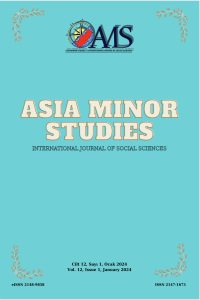Muhammed İkbal’in Hitâb Be Câvîd İle Mehmet Akif’in Asım Adlı Eserlerinden Hareketle Gençlere Nasihatleri
Recommendatıons to Youth Based on Works Named Muhammed Ikbal's Hitâb Be Câvîd And Mehmet Akif's Asım
Author(s): Adnan ŞimşekSubject(s): Cultural history, Studies of Literature, Turkish Literature, 19th Century, Pre-WW I & WW I (1900 -1919), Interwar Period (1920 - 1939)
Published by: Kilis 7 Aralık Üniversity
Keywords: Mehmet Akif Ersoy; Asım; Muhammed İkbal; Hitâb be Câvîd; Nasihatnâme;
Summary/Abstract: Mehmet Akif Ersoy and Muhammad Iqbal are two Muslim poets who lived at the same time but in different geographies. Mehmet Akif Ersoy died in 1936 and Muhammad Iqbal died in 1938. Both of them are like-minded intellectuals who share the same anguish for the future of society. These two poets, whose hearts were on fire with the love of independence and freedom, were also the interpreters of enthusiastic souls and hearts full of faith. Another common feature of these two poets is the importance they attach to youth. Iqbal tries to be a guide for the youth in the person of his son Javid in the address entitled Hitâb be Jâvîd, which was published at the end of his work Cavidname. Hitāb be Jāwīd is a detached work of 136 couplets written in the genre of nasihatname. It is a work that is a continuation of the culture of advice, which is known with names such as siyasetname, hikmet, pendname, vasiyetname and ibretname in classical poetry tradition. Similarly, in his poem Asım in the sixth volume of Safahat, Akif endeavours to guide the young generation in the person of Asım. Asım, which is an independent poem, is a verse story written in the form of mesnevi verse. In this study, Iqbal and Akif's advice to the young generation is discussed comparatively based on their works Hitâb be Câvîd and Asım. Although the geographies they lived in were different, Akif and Iqbal, who were members of the same civilisation, generally expressed the same views. Iqbal adopted the style of classical poetry, presented his advice in this direction and drew a path based on individual values education. Akif, on the other hand, although classical in form, adopted a modern way in terms of style and method, saw the individual as a part of society and considered values education as a social-centred development.
Journal: Asia Minor Studies
- Issue Year: 2024
- Issue No: 2
- Page Range: 171-179
- Page Count: 9
- Language: Turkish

